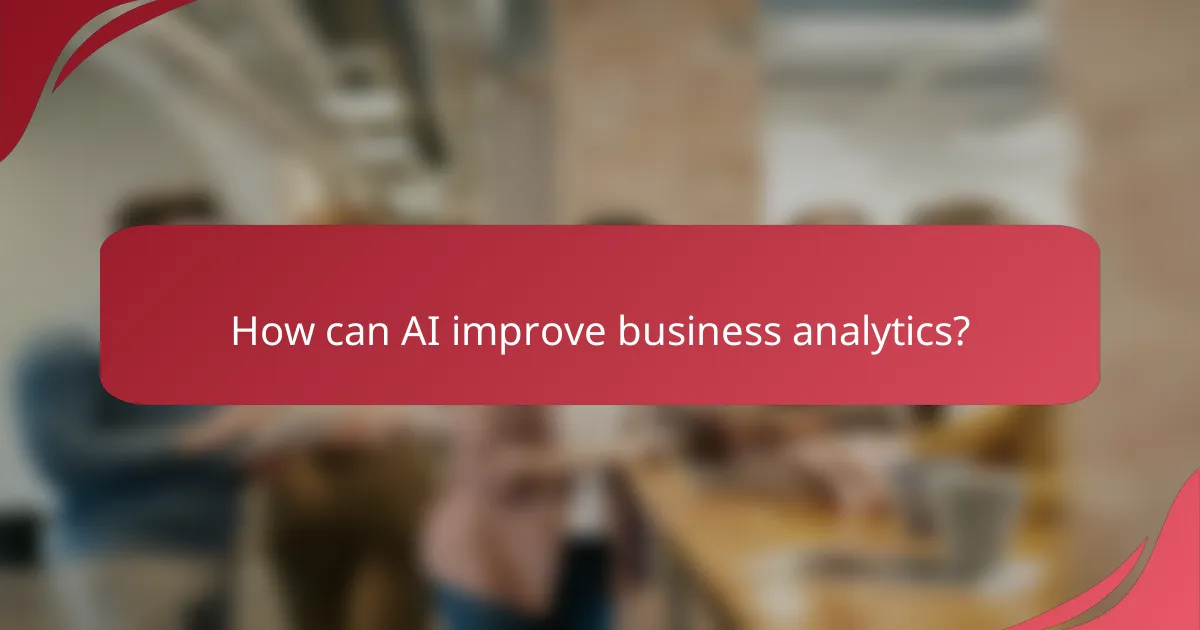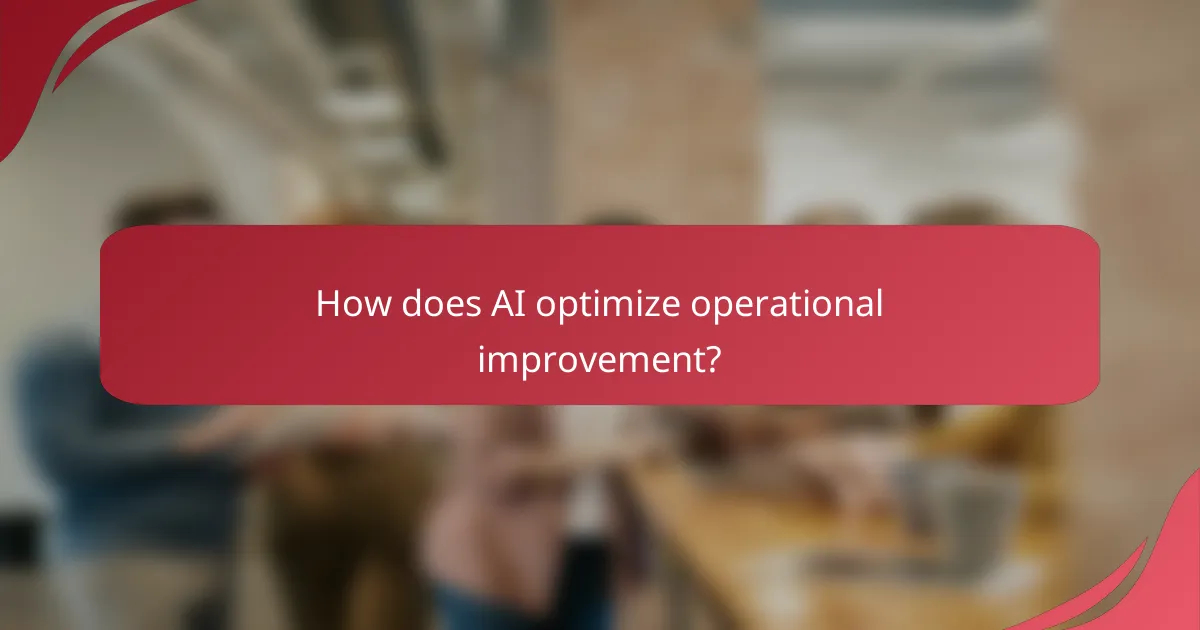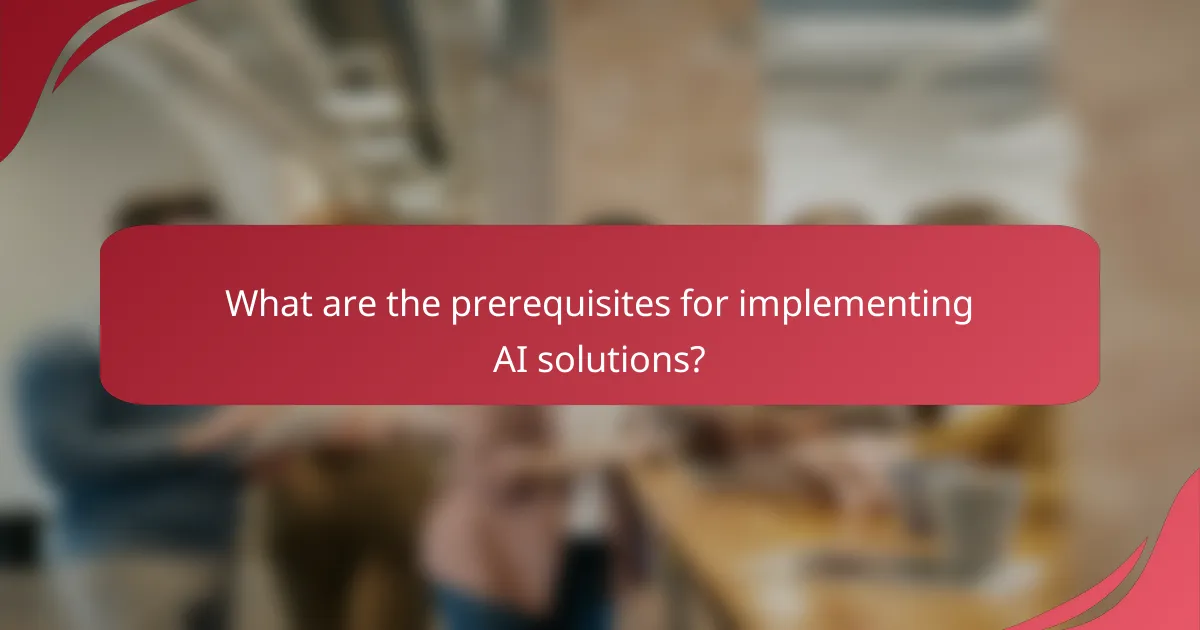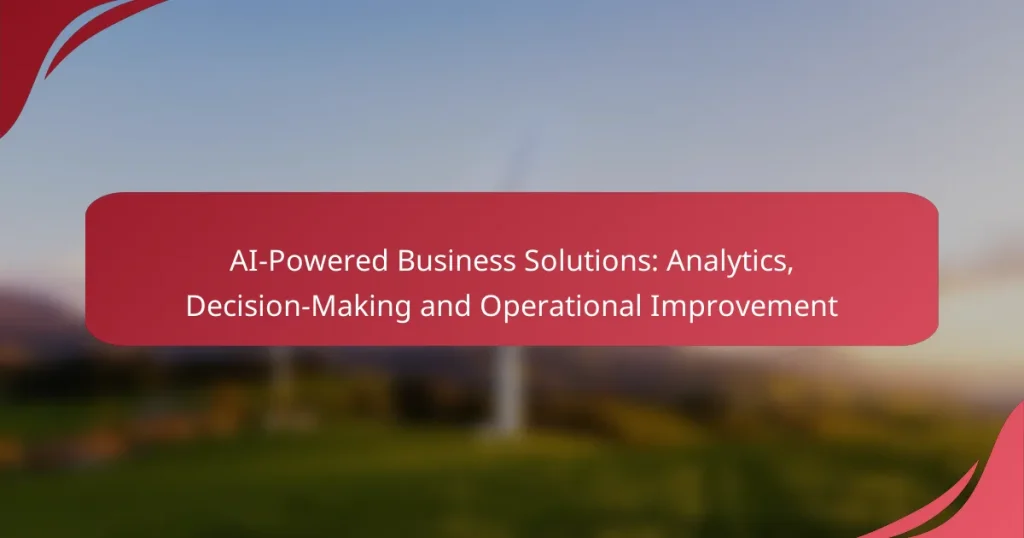AI-powered business solutions are transforming the landscape of analytics, decision-making, and operational improvement. By automating data analysis and providing deeper insights, organizations can make informed decisions more quickly and accurately. Additionally, AI tools like IBM Watson, Microsoft Azure AI, and Google Cloud AI offer tailored features that enhance decision-making capabilities, while also optimizing operations by identifying inefficiencies and streamlining processes.

How can AI improve business analytics?
AI enhances business analytics by automating data analysis, improving accuracy, and providing deeper insights. These improvements enable organizations to make informed decisions faster and more effectively.
Enhanced data visualization
AI-powered tools can transform complex data sets into intuitive visual formats, making it easier for stakeholders to understand trends and patterns. By using techniques like machine learning, these tools can highlight key insights that might be missed in traditional reports.
For example, dashboards can dynamically update to reflect real-time data, allowing users to interact with visualizations and drill down into specifics. This capability supports better decision-making by presenting data in a more accessible manner.
Predictive analytics capabilities
Predictive analytics uses AI algorithms to forecast future trends based on historical data. This approach allows businesses to anticipate customer behavior, market shifts, and operational challenges, enabling proactive strategies.
Companies can leverage predictive models to optimize inventory levels or tailor marketing campaigns, potentially increasing efficiency and revenue. Implementing these models typically involves collecting relevant historical data and continuously refining algorithms for accuracy.
Real-time data processing
AI facilitates real-time data processing, allowing businesses to analyze information as it is generated. This capability is crucial for sectors like finance and e-commerce, where timely insights can significantly impact outcomes.
With real-time analytics, organizations can quickly respond to changing market conditions or customer needs. For instance, an online retailer can adjust pricing strategies instantly based on current demand, enhancing competitiveness.
Automated reporting tools
Automated reporting tools powered by AI can generate reports with minimal human intervention, saving time and reducing errors. These tools can pull data from various sources, analyze it, and present findings in a structured format.
Businesses benefit from consistent reporting schedules and the ability to customize reports for different stakeholders. This automation allows teams to focus on strategic initiatives rather than manual data compilation, improving overall productivity.

What AI tools are best for decision-making?
Several AI tools excel in enhancing decision-making by providing data-driven insights and predictive analytics. The best options include IBM Watson, Microsoft Azure AI, and Google Cloud AI, each offering unique features tailored to different business needs.
IBM Watson
IBM Watson is renowned for its natural language processing capabilities, enabling businesses to analyze vast amounts of unstructured data. It can assist in decision-making by providing insights from customer interactions, market trends, and operational data.
When using IBM Watson, consider its integration with existing systems and the specific use cases you want to address, such as customer service or risk management. Its flexibility allows for customization, but this may require a deeper understanding of AI and data science.
Microsoft Azure AI
Microsoft Azure AI offers a comprehensive suite of tools for building intelligent applications that can enhance decision-making processes. Its machine learning capabilities allow businesses to create predictive models based on historical data.
Azure AI is particularly beneficial for organizations already using Microsoft products, as it integrates seamlessly with tools like Power BI and Dynamics 365. Keep in mind the importance of data governance and compliance with regulations such as GDPR when implementing Azure AI solutions.
Google Cloud AI
Google Cloud AI provides powerful machine learning services that can help businesses make informed decisions by analyzing data at scale. Its tools, such as AutoML and BigQuery, allow users to develop custom models without extensive coding knowledge.
Utilizing Google Cloud AI can lead to significant operational improvements, but businesses should evaluate their data infrastructure to ensure compatibility. Consider starting with smaller projects to gauge effectiveness before scaling up to more complex applications.

How does AI optimize operational improvement?
AI optimizes operational improvement by automating processes, enhancing decision-making, and increasing overall efficiency. By leveraging data analytics and machine learning, businesses can identify bottlenecks, streamline workflows, and reduce costs effectively.
Supply chain automation
AI-driven supply chain automation enhances logistics and inventory management by predicting demand and optimizing stock levels. For instance, machine learning algorithms can analyze historical sales data to forecast future trends, allowing companies to maintain optimal inventory without overstocking or stockouts.
Implementing AI tools can lead to faster order fulfillment and improved supplier collaboration. Businesses should consider integrating AI solutions that provide real-time visibility into supply chain operations to make data-driven decisions quickly.
Process efficiency enhancements
AI enhances process efficiency by automating repetitive tasks and providing insights into workflow optimization. For example, robotic process automation (RPA) can handle data entry, freeing up employees to focus on higher-value activities that require human judgment.
To maximize efficiency, organizations should regularly assess their processes and identify areas where AI can be applied. This might involve piloting AI solutions in specific departments before a full-scale rollout to minimize disruption and ensure a smooth transition.
Cost reduction strategies
AI can significantly reduce operational costs by identifying inefficiencies and optimizing resource allocation. Businesses can use predictive analytics to minimize waste and improve energy efficiency, potentially saving tens of percent on operational expenses.
When implementing AI for cost reduction, companies should focus on areas with the highest potential for savings, such as maintenance scheduling or energy consumption. Regularly reviewing performance metrics will help ensure that AI initiatives continue to deliver value over time.

What are the prerequisites for implementing AI solutions?
Implementing AI solutions requires a solid foundation in data quality and infrastructure readiness. Organizations must assess their existing data and ensure they have the necessary technological framework to support AI initiatives.
Data quality assessment
Data quality assessment involves evaluating the accuracy, completeness, and consistency of the data that will be used in AI models. High-quality data is crucial, as poor data can lead to misleading insights and ineffective decision-making.
To assess data quality, organizations should conduct audits to identify gaps, inconsistencies, and errors. This may include checking for missing values, duplicate entries, and outdated information. A common heuristic is to aim for at least 80% completeness and accuracy before proceeding with AI implementation.
Infrastructure readiness
Infrastructure readiness refers to the technological capabilities required to support AI solutions, including hardware, software, and network resources. Organizations need to evaluate whether their current systems can handle the data processing and storage demands of AI applications.
Key considerations include the availability of sufficient computing power, data storage solutions, and network bandwidth. For instance, cloud-based solutions can provide scalable resources, while on-premises systems may require significant upgrades. Organizations should also ensure compliance with relevant data protection regulations, such as GDPR, when handling sensitive information.

How to choose the right AI solution for your business?
Choosing the right AI solution for your business involves assessing your specific needs, understanding available technologies, and evaluating potential impacts on operations. Focusing on these areas will help ensure that the selected AI tools align with your strategic goals and deliver measurable benefits.
Evaluate business needs
Start by identifying the specific challenges your business faces that AI could address. This could include improving customer service, enhancing operational efficiency, or gaining insights from data analytics. Clearly defining these needs will guide your search for suitable AI solutions.
Consider conducting a needs assessment or stakeholder interviews to gather insights on pain points and opportunities. Prioritize these needs based on their potential impact and feasibility, which will help in selecting the most relevant AI technologies.
Consider scalability options
When selecting an AI solution, ensure it can scale with your business growth. Look for platforms that offer flexible deployment options, whether on-premises, cloud-based, or hybrid, to accommodate varying workloads and user demands.
Evaluate the vendor’s track record in supporting scalability and integration with existing systems. A solution that can grow alongside your business will save costs and reduce the need for frequent replacements or upgrades. Aim for solutions that can handle increased data volumes and user interactions without significant performance degradation.


